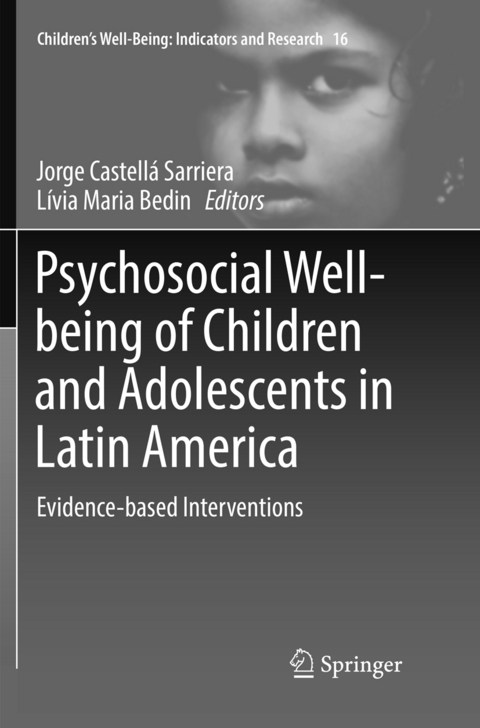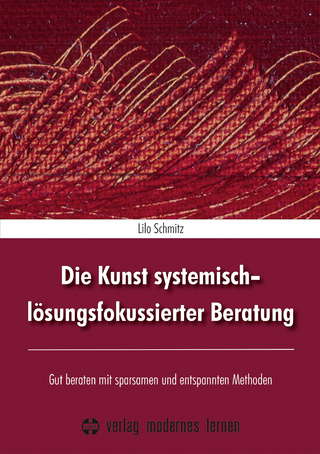
Psychosocial Well-being of Children and Adolescents in Latin America
Springer International Publishing (Verlag)
978-3-319-85705-3 (ISBN)
Jorge Castella Sarriera is a Professor of Psychology at the Federal University of Rio Grande do Sul (UFRGS/Brazil). Dr. Sarriera has been leading the Research Group in Community Psychology (GPPC) since 1993. Dr. Sarriera received his Ph.D. in Social Psychology from the Autonomous University of Madrid (Spain) in 1993; and was a post-doctoral fellow at the University of Barcelona (Spain) and at the University of San Francisco (United States). Dr. Sarriera is a grade 1A researcher for the National Council for Scientific and Technological Development (CNPq) since 2007, and has received an award for the 2015 researcher of the year in the State of Rio Grande do Sul for Humanistic and Social Sciences by FAPERGS. Dr. Sarriera holds the position of coordinator of international research projects with Latin American countries (PROTEBA), and is a member of the ISCWeB network. Dr. Sarriera is also the coordinator of international partnerships with the University of Girona (Spain), the Autonomous University of Madrid (Spain), the University of Barcelona (Spain), and the University of Buenos Aires (Argentina). Dr. Sarriera's research interests include child and adolescents well-being; community psychology and health; immigration, leisure / free time in adolescence; psychosocial intervention in well-being; social programs and evaluation. Livia Maria Bedin is a Professor of Psychology and member of the Research Group in Community Psychology (GPPC) at the Federal University of Rio Grande do Sul (UFRGS/Brazil). Dr. Bedin was a post-doctoral fellow at the Research Institute for Quality of Life in the University of Girona (Spain), and is a board member of the International Society for Child Indicators (ISCI), participating for the last 8 years in international research projects, such as the International Survey of Children's Well-Being (ISCWeB), and the Trans-Latin Project for the Study of Well-Being in Adolescence (PROTEBA). Dr. Bedin holds a Ph.D. in Psychology and a M.Sc. in Psychology from the Federal University of Rio Grande do Sul (Brazil), and was a visiting researcher at the University of Buenos Aires (Argentina). Dr. Bedin's research interests include well-being and quality of life, childhood and adolescence, adolescents-parents relationships, research methodology, multivariate statistical analyses and structural equation modelling.
Part I: Aspects related to children's well-being.- Chapter 1. Advances on Socio-Community Well-Being (Jorge C. Sarriera).- Chapter 2. Spirituality and children and adolescents well-being: theoretical and empirical approach (Miriam R.W. Strelhow).- Chapter 3. Well-being of children in residential care centers (Fabiane F. Schutz).- Chapter 4. Use of software to improve child maltreatment detection (Tiago Calza).- Chapter 5. Neighbourhood and housing as explanatory scales of children's quality of life (Graciela H. Tonon).- Chapter 6. Socio-demographic profile of child well-being in Chile (Javier Guzmán).- Chapter 7. Meanings and social contexts of well-being in children and adolescents from Chile (Jaime Alfaro).- Chapter 8. School and Neighborhood: Influences of subjective well-being in Chilean children (Denise Oyarzún).- Chapter 9. Fatherhood in adolescence and quality of life: a qualitative study of the experience of being an adolescent father (S.G. Câmara).- Part II: Intervention on Children Psychosocial Well-Being.- Chapter 10. Defining psychosocial well-being indicators for children and adolescents (Jorge C. Sarriera).- Chapter 11. Environmental Psychology and child well-being: promoting connections with nature and community (Francielli Galli).- Chapter 12. Rights and material resources as indicators of child well-being: the challenge of promoting protagonism (Tiago Calza).- Chapter 13. Leisure and technology as tools to promote child well-being (Fabiane F. Schutz).- Chapter 14. Subjective well-being intervention: focus on children interpersonal relationships (Bibiana R. Santos).- Chapter 15. Intervention in self-concept: a path to promote subjective well-being (Cristina Hasse).
| Erscheint lt. Verlag | 8.8.2018 |
|---|---|
| Reihe/Serie | Children’s Well-Being: Indicators and Research |
| Zusatzinfo | XVIII, 339 p. 21 illus., 18 illus. in color. |
| Verlagsort | Cham |
| Sprache | englisch |
| Maße | 155 x 235 mm |
| Gewicht | 742 g |
| Themenwelt | Geisteswissenschaften ► Psychologie ► Humanistische Psychotherapien |
| Medizin / Pharmazie | |
| Sozialwissenschaften ► Pädagogik ► Schulpädagogik / Grundschule | |
| Sozialwissenschaften ► Pädagogik ► Sozialpädagogik | |
| Sozialwissenschaften ► Soziologie | |
| Schlagworte | child well-being in latin america • child well-being interventions • environmental psychology and child well-being • fatherhood in adolescence • leisure and technology • meaning and social contexts of child well-being • neighbourhood and housing • Psychosocial Well-Being • spirituality and well-being • Well-Being Indicators • well-being in residential care centers |
| ISBN-10 | 3-319-85705-3 / 3319857053 |
| ISBN-13 | 978-3-319-85705-3 / 9783319857053 |
| Zustand | Neuware |
| Haben Sie eine Frage zum Produkt? |
aus dem Bereich


